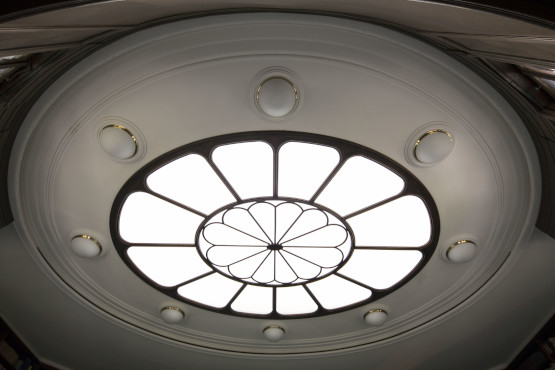Journal

Warburg-Haus, elliptical ceiling rosette
Foto: Arvid Mentz, UHH RRZ MCC
Dynamics of Form II
Lecture series and events on the Focus Topic 2024 in the second half of the year
Cultural and artistic forms as well as forms shaping societies forms are not firm and fixed, but always in motion. They emerge under particular conditions and they stabilize, establish and change across different times and cultural spaces. The question of the dynamics of forms allows us to pay closer attention to the forces at work in their migration and transmission. What is the relationship between their intrinsic potentials and the external influence of actors in changing historical, social, or political contexts? And how do art and culture reflect changes in their forms? Problems of form in the very literal sense are to be investigated, that is, geneses and adaptations, which possibly allow for insights into their dynamic preconditions precisely where the forms remain incomplete, or dissolve. What special role, then, do ephemeral, elusive, or distorted forms play? What cultural power do forms unfold in images and ideas? With these questions, the thematic focus invites to question theoretical traditions of form reflection and to discuss concrete artistic and cultural (non-)forms.
Research into the emergence and reproduction of forms as well as their flexibility and elasticity has a long tradition at the Warburg-Haus in Hamburg. With his philosophy of symbolic forms, Ernst Cassirer laid the foundation for a philosophy of human culture; Aby Warburg investigated the medial conditions of the distortion and transformation of pictorial formulas in the process of migratory movements. These traditions have been and are being continued in the projects ›Bilderfahrzeuge‹ (BMBF) on the materiality of pictorial traditions, in the project of digitizing the ›Image Index of Political Iconography‹ (DFG) as well as in the Centre for Advanced Studies ›Imaginaria of Force‹ (DFG), in which dynamic conceptions of the arts are discussed.
The program of scientific lectures and conferences takes place in close cooperation with the NOMIS research group ›Traveling Forms‹ (University of Konstanz) and the DFG-Centre for Advanced Studies ›Imaginaria of Force‹, as well as a series of other cooperational partners from Hamburg and abroad.
The international Warburg Seminar on ›Energy Landscapes‹ takes place from October 14 to 17, organized by the DFG-Centre for Advanced Studies ›Imaginaria of Force‹ and the Warburg-Haus, conceived by Franca Buss, Frank Fehrenbach, Laura Isengard, Mia Hallmanns and Cornelia Zumbusch. In the second half of the year, the focus topic lecture series will feature Ingo Uhlig, Halle, giving the public evening lecture of the Warburg Seminar 2024; Juliane Vogel, Konstanz, who will give the Warburg Lecture 2024 on the occasion of the 95th anniversary of Aby Warburg’s death; and Valentin Groebner, Lucerne, laureate of the Aby Warburg Foundation’s scholar’s prize 2024. Further events in cooperation with partners complete the programme: a presentation of the study by the Bildungsstätte Anne Frank (Anne Frank Education Center), on The TikTok Intifada – October 7 & its online aftermath, in cooperation with the Landeszentrale für politische Bildung, Hamburg (State Agency for Civic Education), a panel discussion on AI in academia: method or colleague? in cooperation with the Hamburg Institute for Advanced Study e.V. (HIAS), as part of the »Hamburger Horizonte« 2024, a dialogic tour of the exhibition In and Out of Place. Land after Information 1992 – 2024 at the Kunstverein in Hamburg, and a screening of Agnès Varda’s well-known documentary The Collectors in the reading room in cooperation with Flexibles Flimmern – Das mobile Kino.
Dynamiken der Form II